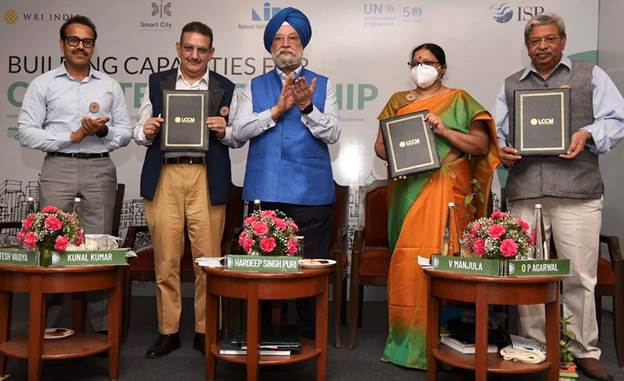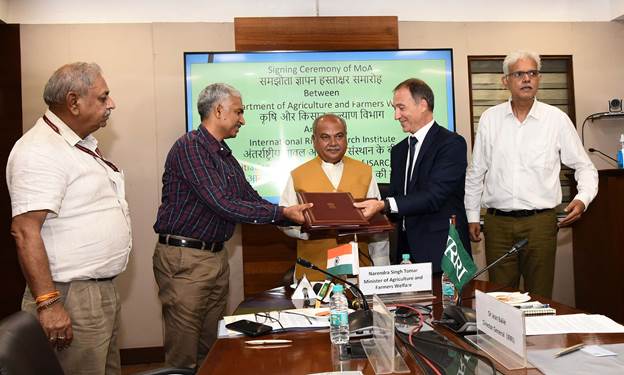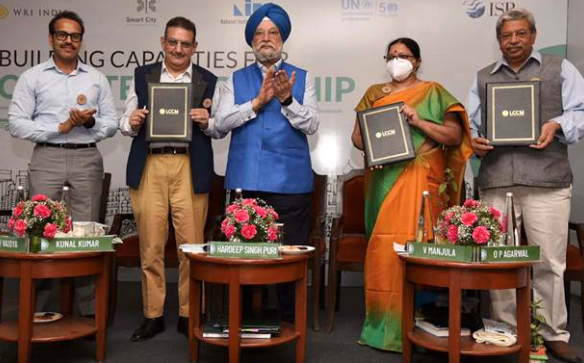Hardeep Singh Puri launches the Leaders in Climate Change Management Program to help urban professionals champion climate action in India
Radiance News Service
In conjunction with the World Environment Day that was observed on June 5, the National Institute of Urban Affairs (NIUA) and World Resources Institute (WRI) India, jointly announced ‘Leaders in Climate Change Management’ (LCCM), a practice-based learning program today. It aims at building capacity among urban professionals to lead climate action across sectors and geographies in India. To facilitate this face-to-face learning program, the Administrative Training Institute (ATI), Mysuru, also singed a tripartite Memorandum of Understanding (MoU) with NIUA and WRI India, becoming the first delivery partner of the LCCM program.
LCCM envisions capacitating 5,000 professionals, including mid to junior-level government officials and frontline workers, and preparing them to champion climate change adaptation and mitigation solutions towards a coordinated effort to achieve India’s climate commitments. The launch also marked the achievements of the Ministry of Housing and Urban Affairs towards India’s urban climate goals.
The Union Minister for Housing and Urban Affairs Hardeep Singh Puri, launched the learning program and a half-day workshop today to build capacities among climate leaders in Indian cities.

In his keynote address, he said, “It is most appropriate and fitting that we are launching the (LCCM) program today immediately after the celebration of World Environment Day yesterday. This program is another initiative in a long line of government interventions to not only combat climate change but also to build a new path of sustainable development that fulfils our economic conditions.”

Puri said, “In the last eight years, the Modi government has taken many concrete steps in pushing the sustainability agenda forward. At COP26 in Glasgow, the PM announced India’s aggressive agenda on climate change through the Panch Amrit action plan which envisages India becoming a net-zero emission country by 2070. The LCCM program launched today, seeks to not only identify hundreds of climate leaders but also focus on how these leaders can be oriented in terms of their training and how will they move forward. The very fact that we are thinking about this is a revolutionary step,”.
At COP26 last year, Prime Minister Narendra Modi proposed a five-fold strategy – Panch Amrit – to global leaders, extending India’s co-operation to meet the 1.5 degrees Celsius targets. The LCCM program, designed and implemented in partnership with the United Nation Environment Programme (UNEP) and Indian School of Business (ISB), aims to strengthen India’s workforce to achieve this goal.
LCCM is a blended learning program for urban practitioners looking to upskill and prepare themselves to deliver effective climate action. The program has four phases: the first phase- is an online learning module that can be completed over eight weeks; the next includes face-to-face sessions spanning four to six days; the third phase mandates participants to complete a project over six to eight months and attending exposure visits; and the final phase includes networking and establishing a community of practice.
The online learning will be hosted on the National Urban Learning Platform (NULP), the capacity building arm of NIUA. It will also be hosted and supported by ATI, Mysuru. The program aims to sign similar MoUs with ATIs across India over the next few months.
Puri also launched the Climate Data Observatory 2.0 website, Knowledge Product on Public Spaces, Urban Outcomes Framework 2022 – Data Collection Portal, and Citizen Engagement for Urban Transport Compendium, to celebrate another milestone achieved by NIUA in the urban environment sector. The National Climate Photography Award Winners and Stage One qualifying cities for Transport 4All Innovation Challenge were also announced.
At COP26 last year, Prime Minister Narendra Modi proposed a five-fold strategy – Panch Amrit – to global leaders, extending India’s co-operation to meet the 1.5 degrees Celsius targets. The LCCM program, designed and implemented in partnership with the United Nation Environment Programme (UNEP) and Indian School of Business (ISB), aims to strengthen India’s workforce to achieve this goal.
LCCM is a blended learning program for urban practitioners looking to upskill and prepare themselves to deliver effective climate action. The program has four phases: the first phase- is an online learning module that can be completed over eight weeks; the next includes face-to-face sessions spanning four to six days; the third phase mandates participants to complete a project over six to eight months and attending exposure visits; and the final phase includes networking and establishing a community of practice.
The online learning will be hosted on the National Urban Learning Platform (NULP), the capacity building arm of NIUA. It will also be hosted and supported by ATI, Mysuru. The program aims to sign similar MoUs with ATIs across India over the next few months.
Puri also launched the Climate Data Observatory 2.0 website, Knowledge Product on Public Spaces, Urban Outcomes Framework 2022 – Data Collection Portal, and Citizen Engagement for Urban Transport Compendium, to celebrate another milestone achieved by NIUA in the urban environment sector. The National Climate Photography Award Winners and Stage One qualifying cities for Transport 4All Innovation Challenge were also announced.


